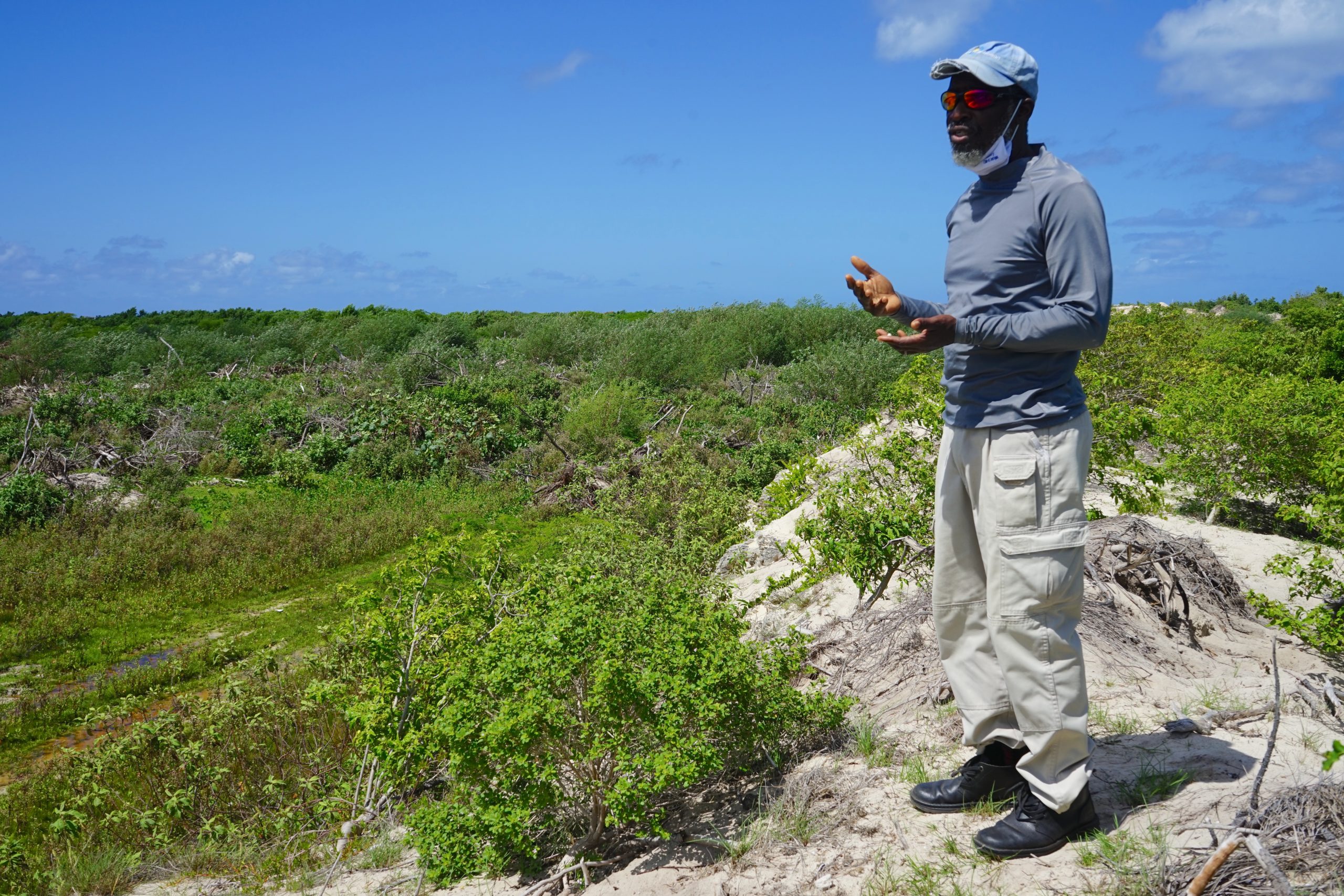
By Elesha George
“They don’t even know what they have destroyed and that is the awful thing about it,” remarked marine biologist John Mussington, as he recalled the apparent destruction of sand dunes and wildlife habitats at Palmetto Point, Barbuda.
Mussington is one of a number of Barbudans opposed to the environmental degradation that they say the Peace, Love and Happiness (PLH) development is likely to cause by constructing a golf course spanning hundreds of acres on protected land within the Codrington Lagoon National Park.
He claimed the developer is destroying turtle nesting sites, disturbing natural habitats and uprooting important plant species and organisms in order to build their luxury project.
“The physical destruction which they have done with bulldozers and the excavators, they have levelled those sand dunes which means the vegetation which is on there, they are gone, scraped off,” Mussington said.
“When you specifically study the number of species which you have lost, there are certain plants there which we have lost that we have not yet even identified scientifically.
“When you take the sum total of the area which was levelled you’re talking about millions of species – plants, plus the insects, plus the bacteria, plus all the other creatures that depend upon them,” he continued.
PLH, in response to an order from the Development Control Authority (DCA), had formulated a remediation plan to reduce the impact of activities the company undertook without environmental and scientific review guidelines in July 2020.
For example, they have erected geo tubes, are repairing sand dunes, and are nursing and transplanting important plant species that have been uprooted.
But Mussington does not believe that these measures are enough to reverse the damage.
“Every single place where the geo tubes have been deployed, they have failed,” he claimed, explaining that plants like sea grape and buttonwood mangroves which grow in the area have deep roots and cannot simply be replanted.
When PLH was interviewed last week by the Barbuda Channel, developers spoke of their community efforts on the sister isle and their willingness to work with the Council to develop the island. But Mussington believes that project president Justin Wilshaw was merely “greenwashing”.
“What they are attempting to do is to justify the destruction by saying they are doing wonderful things,” he said.
Greenwashing refers to efforts made by a company to market itself as environmentally friendly, rather than on actually minimising its environmental impact.
Mussington also accused Wilshaw of spreading “misinformation” when he said that the developer is restoring a significant portion of damage caused by sand mining undertaken by the Council in the area.
Barbuda MP Trevor Walker also supported the claim of misinformation by claiming firstly that the Barbuda Council had never mined sand where the golf course is currently being constructed.
“The area that the golf course is presently being constructed on, the Barbuda local Council has never touched, mined or disturbed anything in that area when it comes to that natural habitat,” he said.
According to Walker, “Even though the Barbuda Council engaged in sand mining, we had enough sense, we took expert advice as to where sand mining could have been done.
“It’s not the best thing to do but the fact of the matter is we ensured that we not only protected the island by not touching anything to the site of Palmetto Road but we also ensured that the place is kept in a particular way.”
Meanwhile, Walker believes that the developer has eliminated the island’s famous black coco plum fruit (one of three types of plums there) by carrying out construction activities at the Palmetto Point site.
“Given what PLH has done in the area, that particular species of coco plum has totally disappeared from Barbuda,” Walker claimed, adding that the developer knew that the species existed in the area before beginning its work.
However, Wilshaw denied the plum had been eradicated, saying there had been “significant propagating” of the fruit.
“PLH ensures all native areas are reviewed and mitigated independently prior to commencing work. With this species, PLH has in fact increased the population,” he told Observer.
Wilshaw also claimed, “Both Mr Walker and Ms Calsey Beazer from the Barbuda Council have outlined their support for sand mining on PLH’s leased premise.”
He continued, “Scientific studies and local reports highlight the peninsula’s ecosystem has been damaged by 50 years of mining and the sand removal has been down to groundwater level.”
Wilshaw added, “With the dismissal of the Barbuda Council’s temporary injunction, we respect the judgement made and regulatory authorities’ process that has been carried out to date.
“PLH will continue to welcome monthly visits from the regulatory bodies, to ensure full visibility and compliance with environmental standards agreed to.”
